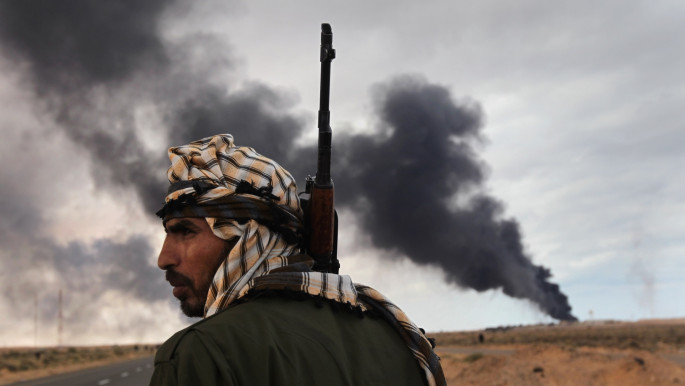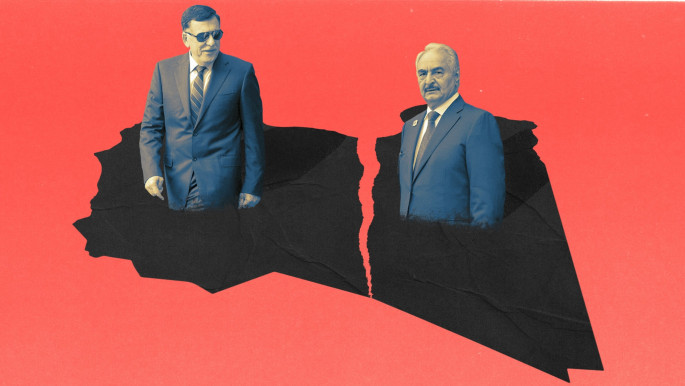Libya ceasefire: Window of opportunity or doomed to fail?
On paper, the agreement, which aims to hold elections in March 2021 and restart oil production and exports, is a first step towards forging a unified peace deal while rendering Haftar more irrelevant.
The prime minister of the Tripoli-based Government of National Accord (GNA) agreed the deal with Aguila Saleh, speaker of the rival Tobruk-based House of Representatives (HoR) in eastern Libya. Promisingly, violence has so far not broken out.
However, there are still underlying tensions following the agreement. Though the focus was on the GNA-HoR deal, the elephant in the room was Haftar's response.
While the international community, including the European Union and UN Secretary General Antonio Guterres, welcomed the move, Haftar then rejected it on 23 August.
His spokesperson dismissed the peace calls as "media marketing," claiming the GNA still threatened to advance on Sirte. He evidently wants to see the deal falter and his self-styled Libyan National Army (LNA) is becoming increasingly irrelevant following the Turkish-backed GNA's recapturing of territory, evidenced by the fact that he was not consulted in this agreement.
Stronger framework for peace
A key driver behind the agreement is that Libyans have become battle-weary in a largely 'Libyan vs Libyan' war, while international powers are viewing it as a stalemate. The intensity of violence has largely dropped since June. Turkey's military intervention backing the GNA against Haftar bolstered the Tripoli government and pushed Haftar back.
 |
The agreement, which aims to hold elections in March 2021 and restart oil production, is a first step towards forging a unified peace deal while rendering Haftar more irrelevant |  |
Aguila Saleh, the speaker of the House of Representatives, is seen as a legitimate voice in the eastern government, and a better counterbalance to Haftar. Egypt and Russia increasingly favour Saleh, after both previously backed Haftar, and always saw him as a Plan B as Haftar became more irrelevant. After his operation to capture Tripoli failed, his backers now view him as more of a burden.
GNA elections are aimed to be held in March 2021. The GNA had parliamentary elections delayed initially from December 2018, until 2019, so this would raise hopes that warring sides can finally come to an agreement with one another.
Many hope the agreement can also guarantee the merging of armed forces and a constitutional government. One which could also eventually lead to a decentralisation of power from Tripoli - which has been a contested power centre since the fall of Muammar Gaddafi's regime in 2011.
 |
|
| Read more: Divided Europe: How the West lost influence in Libya's war |
Ultimately however, this announcement mostly just creates a new framework for peace, which depends on international powers supporting it, as external actors have driven Libya's violence. Analysts also argue that without substantial pressure, the deal itself may simply lead to a 'frozen' conflict and an uncontrolled de-facto partition.
The limits of partition
Partitioning Libya between a Tripoli and eastern government would not solve the tensions in the country. It could even bolster the rivalry between different camps who could compete over influence and resources. Moreover, it would not necessarily aid the growing societal and humanitarian problems within Libya.
Public services are weakened and unable to meet people's needs. A humanitarian crisis is spreading, as is the coronavirus, as cases have more than tripled in August alone, while the conflict has battered its healthcare system. The crisis has plunged many Libyans into poverty as basic goods like milk, bread, vegetables and fuel are difficult to obtain. Civilians also struggle to obtain cash from banks. This shows the urgency of first creating a stronger state and unity between conflicting parties.
 |
Analysts argue that without substantial pressure the deal itself may simply lead to a 'frozen' conflict and an uncontrolled de-facto partition |  |
Meanwhile, daily protests in the GNA-held Tripoli are now occurring against poor living conditions, with calls for prime minister Fayez Sarraj to resign, prompting him on 25 August to promise a cabinet reshuffle.
Yet continued foreign intervention could drive a de-facto partition of the country. Russia continues bolstering an eastern Libyan government, while supporting a ceasefire deal and cooperating with Turkey. It could achieve this through its ties with the GNA, working as a mediator between the east and the west, while bolstering its influence in the east. This would not be a problem for Moscow. Though Egypt, another key backer of Haftar, warned of a military intervention, this would have only occurred should Sirte fallen to the GNA. Should it stay in line, it may take a more favourable option of backing Saleh.
Some eyes have remained on Abu Dhabi, as it welcomed the ceasefire despite being Haftar's greatest backer during his offensive. The renewed prospects of a stable, democratic government with political Islamists would still threaten Abu Dhabi's interests, as it backed Haftar to undermine such an outcome. It would also aim to ensure it can invest in Benghazi's port and gain influence in the east.
There is little reason to believe the UAE is serious about supporting a peaceful agreement, as this would gift its rival Turkey a victory. Moreover, Abu Dhabi has been tipped to pressure Egypt against supporting peace agreements with the GNA.
 |
|
| Read more: Is Libya on the road to de facto partition? |
Moreover, the normalisation agreement with Israel and the UAE on 13 August could grant the UAE further impunity in Washington, even if Joe Biden became president, while Trump would continue his almost unconditional silence over the UAE's actions. The UAE also seeks to gain advanced weaponry from the US and Israel as part of the agreement, including F-35 fighter jets. Though this has been refused so far, such tools could bolster Abu Dhabi's operations.
Nonetheless, the agreement has tightened the UAE's alliance with Israel, in Abu Dhabi's bid to steer Tel Aviv towards supporting its pro-authoritarian and anti-Turkey alliance. Israel reportedly had a secret relationship with Haftar, supplying him with weapons. It may be looking to court Israel to support its bid for influence in a separatist eastern Libya. However, given Russia's increasing clout, and Moscow's willingness to cooperate with Turkey, this could largely subdue any Emirati attempts to fracture the deal.
Though it remains to be seen how the deal could pan out, there are plenty of risk factors which could undermine it, and alone it is far from an end-all agreement to Libya's conflict. Largely it still comes down to the clashing of interests between warring parties.
If Europe and the wider international community can unite and push for the upholding of these elections and terms, it could eventually lead to a fairer agreement between both sides and Libyan civilians.
Follow him on Twitter: @jfentonharvey





 Follow the Middle East's top stories in English at The New Arab on Google News
Follow the Middle East's top stories in English at The New Arab on Google News


